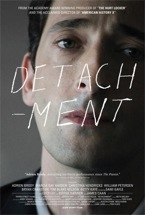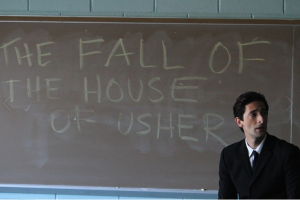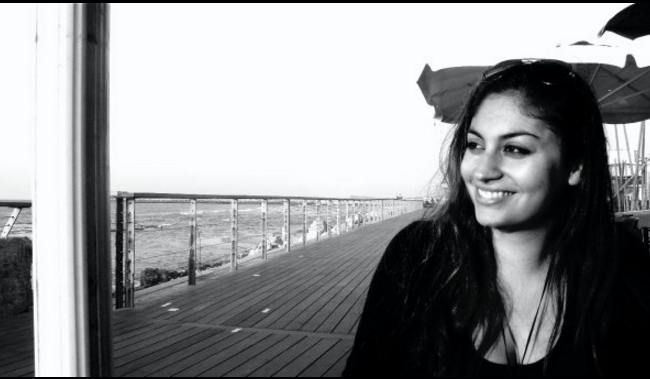
(Detachment premiered at the 2011 Tribeca Film Festival. It is being released theatrically in New York City by Tribeca Film on March 16, 2012, and opens in Los Angeles a week later. It is also now available on VOD. Visit the film’s official website to learn more.)
Movies about teachers, even and especially the “troubled” ones, tend to wear their message on their sleeve: teachers are good, teachers are inspirational, teachers are under-appreciated. Detachment does this to an extent, but its in-class scenes are hardly the focal point. It instead uses them, as well as a title-supplying epigraph from Albert Camus, as an academic means of approaching its distant protagonist (whose last name just happens to be Barthes). A long-term substitute who bridges the gap between permanent teachers and tends not to forge any meaningful or long-lasting bonds in the process, Henry has an ailing grandfather in the hospital and a predilection for darker themes: his lesson plans are bookended by self-written eulogies for his new students and a lecture on The Fall of the House of Usher. He has an eloquent cynicism about him and a calm that immediately sets him apart from his chaotic, inmates-running-the-asylum surroundings, but his zen-like countenance is less an accurate rendering of the man as he really is and more a defense mechanism—like a way of avoiding questions he’d rather not be asked in the first place. Detachment labels itself as “a Tony Kaye talkie,” but the words that carry the most weight are those which go unspoken.
Here is a film that, the longer it rests in the mind, the more it reveals itself as a deeply ambitious work—a mess, perhaps, but a beautiful one at that. Kaye’s intensity behind the camera is matched only by Adrien Brody’s in front of it; where a lesser performance would have derailed the entire project, Brody anchors it with understated nuance of the sort that’s easy to dismiss as empty and privileged. The truth is that it’s quietly powerful and wholly sincere. Between the two of them—to say nothing of a massive ensemble cast rounded out by Christina Hendricks, Marcia Gay Harden, James Caan, Lucy Liu, and Bryan Cranston—this is a movie that leaves it all on the field. Certain aspects may have benefited from the sort of restraint that Kaye quite frankly seems incapable of, but his impassioned approach is never less than admirable. If he and this film suffer from anything, it’s an overabundance of the same ambition that makes it so affecting. Worse afflictions come to mind.
 I say again: Detachment is not about teachers or teaching or the public school system. It’s about the many ideas that fill its protagonist’s head, ideas which happen to be most readily expressible in academic terms and a scholastic environment, and the ways in which he both does and does not express them. Henry’s mind is flooded with rapid-fire images of his dead mother on a daily basis, and the collage-like manner in which Kaye presents them to us is as close as we come to getting a sense of who this man is and what drives him, haunts him. Kaye may use the grammar of a familiar genre to place this character, but what’s more compelling than what’s gradually revealed about him throughout the film is our increasing awareness that this is merely the tip of the iceberg. Little about Brody’s character is unique, but everything from his line delivery to his gestures imply more than even he seems aware of. We want to know more about him; he holds back. It’s an arresting performance of the sort Joaquin Phoenix put together in Two Lovers: so internally expressive that he’s almost invisible to the outside world.
I say again: Detachment is not about teachers or teaching or the public school system. It’s about the many ideas that fill its protagonist’s head, ideas which happen to be most readily expressible in academic terms and a scholastic environment, and the ways in which he both does and does not express them. Henry’s mind is flooded with rapid-fire images of his dead mother on a daily basis, and the collage-like manner in which Kaye presents them to us is as close as we come to getting a sense of who this man is and what drives him, haunts him. Kaye may use the grammar of a familiar genre to place this character, but what’s more compelling than what’s gradually revealed about him throughout the film is our increasing awareness that this is merely the tip of the iceberg. Little about Brody’s character is unique, but everything from his line delivery to his gestures imply more than even he seems aware of. We want to know more about him; he holds back. It’s an arresting performance of the sort Joaquin Phoenix put together in Two Lovers: so internally expressive that he’s almost invisible to the outside world.
It isn’t that Kaye doesn’t have more than a few screws loose or that aspects of his film aren’t bothersome—if anything, the interspersed chalkboard animations and faux-interviews feel tailor-made to alienate viewers like me. But while Detachment has a number of things working against it, the clichés it uses as a starting point must be understood for what they are: a means to a more than worthwhile end. What shortcomings show up along the way are dwarfed by the single- (or maybe several-) minded intensity of both director and star. The film’s initial concerns are eclipsed as its focus shifts from school to pupil to teacher, leaving us to study a character who isn’t quite ready to examine himself.
— Michael Nordine












Pingback: HOME VIDEO PICKS – Hammer to Nail